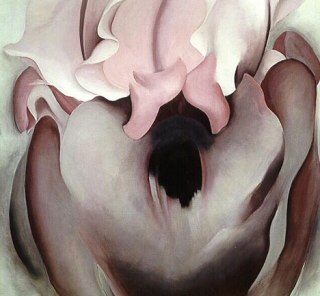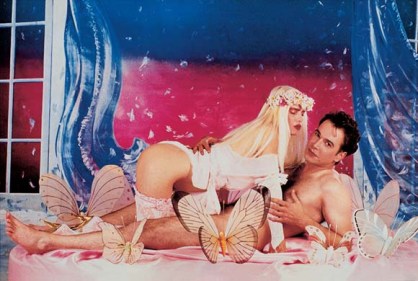Wherever we look around us – especially while in a morose and misanthropic mood – we see “relationships”. Now, strictly philosophically speaking, a “relationship” is a concept designating an element which mediates between two things. Accordingly, we can propose, for example, that there is a “relation of proximity” between me and my cat right at this moment, or a “relation of friendship” between me and my neighbour, etc. The question at the forefront of our discussion today will revolve an especially interesting relationship – the “sexual relationship” – and more particularly Jacques Lacan’s assertion that “There is no sexual relationship”.
Lets start with a first definition: a sexual relationship mediates between two individuals and involves sexual enjoyment.
[The polyamorous readers might take into account that a ternary relationship (a threesome) actually consists of three binary relationships]

But what exactly is sexual enjoyment? Well, we can approach the question of sexual enjoyment (without discriminating any of its forms) on two levels: the physiological level – I.E. of the real bodies – and the psychological level – I.E. the one that takes place entirely in our minds. Sexuality, as it is manifest in the physiological level, has to do with a strange form of friction, setting a variety of mucous membranes and several types of sponges into action, which sometimes leads to procreation, but mostly just to an original form of biological expenditure. This dimension of sexuality completely lacks social and symbolic context; in it sexuality is a senseless, chaotic, grotesque collision between different masses of tissue. It is quite obvious that, as human-beings, we do not enjoy sex in a strictly physiological manner; that in order to ‘get off’ we require some’thing’ to assist us in painting this whole picture in a different light. This intervention takes place on the psychological level – through the meaning each and every one of us attributes to this senseless act which we all are so curiously attracted to.

So, how does one enjoy? The answer to this question is found in the cultural domain, in language, at childhood. It is a question which does not have a single right answer, but has a multiplicity of answers – for we are, according to Freud, at our root “polymorphously perverse”. Soon enough you learn that some ‘get off’ the voice of their partner, while some can ‘get off’ only in the presence of high-heals. It is not the physiological sexual act which defines our enjoyment, but the way in which we interpret it on the basis of the symbolic and imaginary domain of our accumulated social existence.
Now, if our enjoyment is mediated through a symbolic or imaginary interpretation of the sexual act, then we have to assume that it necessarily entails a relationship to an image or an object in our psychic reality. Moreover, if interpretation is unavoidably lacking – especially when it has to do with a human being – then we cannot assume that this object can truly encompass the metaphysical girth of a subject. In other words, there is no way to take a subject, a human being, and reduce her or him into an image or an object (outside of our own mind that is). A subject is always more than the object we make of him or her – there is always more to my sexual partners than what I make of them during sex. That is what makes sex with people so much more enjoyable then sex with inanimate objects (although there are those very unique forms of fetishism). Therefore, it is clear why it is not the other subject which is included in our sexual enjoyment, but an object that we make of him or her, or assume that he or her has. It is something in them – most of the time something that they do not actually posses – that we ‘get off’ on. That something is the object of our desire, carefully assembled through our traumatic encounters with sexuality at a young age and our admirable attempts to make some ‘symbolic’ or ‘imaginary’ sense out of them. It is an object which is ours, rooted in an original (object) cause that is ours, through which we can gain access to our own enjoyment. This form of enjoyment is a narcissistic enjoyment – it takes place in my body, under my interpretation, and in relation to an object which gains its reality strictly in relation to my fundamental fantasy.
That is why, if we assume that a sexual relationship is necessarily conditioned on sexual enjoyment, we cannot assume that it entails a relationship to a subject. And indeed, Lacan reminds us again and again that, while having sex, the individual is in actuality alone. That the beautiful image of a naked body pressed on another is an ‘image’ – an ‘imag’inary representation; that sexual enjoyment is always narcissistic, and takes us far away from the subject with us to the domain of fantasy – of the object of desire.

Now we can better understand one facet (amongst many others) of Lacan’s famous aphorism – “there is no sexual relationship”; an argument which was especially shocking in an era where everybody was constantly talking about sexuality. Lacan claims that in the sexual act the subject forms a relationship with an object, that desire is fetishistically set on the other – his or her ass, breast, cock, voice, gaze… This is a desire which is confined by its cause, and thus cannot be truly incorporated in the other subject, but can only be projected as an object that his or her body carries for us; an object singularly concocted in the framework of our own fantasy. Interestingly enough, Lacan sometimes calls this form of enjoyment ‘hommo-sexual’ – a play on the french word ‘homme‘ (meaning man), designating an enjoyment which includes only one and the same person (or masculine enjoyment – more on that later on…).
Nevertheless, the fact that “there is no sexual relationship” does not necessarily imply that there are no other subjects in the world! On the contrary, it is exactly the objectification of our partners – meaning, the assumption that they carry this object of our desire – which implies their subjective reality. It is only a subject that can carry this object, or what Plato and Lacan call “agalma”. It is the insistence on the apprehension of the ‘non-relation’ of sex, the ‘void’ of the sexual relationship, and axiomatically validate the existence of a second subject, that we can call ‘love’. Through love, which first has to go through desire, we bestow being on the subject. Yet, we should not get confused, this is not a “subject-on-subject” relationship, it is not a relationship at all, but a supposition of the existence of “the scene of the Two” (see: Alain Badiou); a place in the world, constructed through the experience of love, and under the axiomatic fidelity to the idea of living as-Two. But love is for another time, we first must meddle a bit more in the domain of desire. All of this and a little more will be tackled in the upcoming posts.

[…] from flesh and from an image we have in mind. (This strange view is explained in more detail in this blog post by Leon Brenner.) Laura Mulvey describes the woman as made into an object, first by the […]
LikeLike